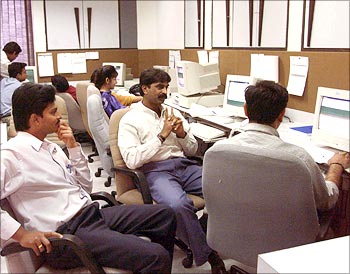
Ashish Gupta, the managing director of Helion Advisors, a venture capital firm, is very humble about his achievements.
He calls himself a 'maggu' (those who learn things by rote without understanding the underlying concepts of a given subject) without batting an eyelid when asked how he won the gold medal when he studied Computer Science at IIT-Kanpur. It's altogether a different thing that not all 'maggus' score 10 grading points on a scale of 1 to 10, which Ashish did, to win the medal.
He carried this humility forward when he went to do his PhD in Computer Science from Stanford University, California, and then when he worked at IBM, Oracle Corporation and later help co-found Junglee.com with four others in 1996.
Two years later Amazon.com bought this start-up for a cool $ 280 million. The wealth of experience that Ashish gained during all these stints has held him in good stead and played a big role in him becoming a venture capitalist.
Today as the managing director of Helion venture partners his company has a $ 350-million India-focused fund. Ashish spoke to Prasanna D Zore about how his impressions changed while studying at Stanford, lessons he learned as an entrepreneur and offers his dos and don'ts to start-up companies and young entrepreneurs.
Tell us something about yourself
I'm the son of an Army officer who is a cartographer. So I had the privilege to wonder around most of India, as I was growing up, to places like Mount Abu, Shillong, Dehradun and did my schooling from there. Then I went to IIT-Kanpur to study Computer Science there in 1988.
Later I moved to the US to get a PhD in Computer Science from Stanford University in California.
How did Stanford happen? Why did you move there?
I moved to Stanford because that is what everybody else did. I did it not because of any great insight or any great love of learning. But the done thing then was whoever gets a scholarship to US should try and go to the US and without much thinking I did exactly the same like what my seniors did. During those days almost 50 per cent of the students would try and get scholarships to the US. So I never honestly questioned whether that was the right thing or the wrong thing.
So I did it more in terms of bhed chaal (herd mentality) for those who speak Hindi. That was how I ended up going to the US. I applied to a number of colleges and was fortunate to get to Stanford.

As a fresher at Stanford what challenges did you face?
The experience at Stanford was truly eye opening. I realised then that while I was reasonably successful at IIT-Kanpur it was a completely different ball game there. It was amongst the most depressing experiences which ultimately translated into character-building experiences. One of the things that became blindingly clear is that I had not been taught how to think clearly at IIT-Kanpur.
So while I had been taught and I had learnt how to solve problems what I was sorely lacking in was how to identify problems. And how to identify problems is actually a much more valuable skill than actually how to solve them. How to solve problems becomes a commodity and in many ways is the basis of the IT outsourcing business and the knowledge process outsourcing business. It is from what problems to solve which is where the money originates from for these business which is the hard part.
And that is what I realised when I went to Stanford and I was singularly ill-equipped vis-a-vis figuring out what problems to solve and that is what I learned during my PhD. So for me PhD was a process of learning a little bit about how to identify problems rather than how to solve problems.
Is that the biggest difference between IIT-Kanpur and Stanford?
I think things have improved on that count in India even at the school level and not just at the IITs.
Kids are encouraged actually to try and think about research-oriented projects; taught about what is wrong in throwing garbage on the street; why is water a precious resource and what should you do about it.
Whereas I am from that generation of schooling where I was told to write an essay on the cow and we weren't allowed even to think about what animal I would write an essay on. So from there to today, to figure out what is wrong with the environment and why should we think about it, is a sea change in how kids are taught today.
So at that point in time, the answer to your question is, indeed as an education system, the undergraduate education at IIT was definitely not as good at teaching people how to think.

Did Junglee.com happen at Stanford?
I actually graduated from Stanford and worked for IBM, Oracle Corporation, and while working at Oracle I help start Junglee. It was a few years after graduating from Stanford in the middle of 1996. I actually started in January 1996 but it took some time to rustle up some 600,000-odd thousand dollars to start it. So it was a painful process to get that money lined up.
What were the challenges before Junglee.com as a start-up company?
The challenges were many starting from the fact that we didn't know what business we were in. We were on the net but nobody really knew how to make money from the Internet in 1996 in the US. Furthermore we did not know what business problem we were solving. We thought we had a technology solution that we were building but we did not know what business problem it could be applied to. So it was a classic hammer-in-search-of-a-nail kind of scenario.
The other problem was it was not easy to raise money. So what ended up happening is that we started building an application to demonstrate the power of our technology and then we realised that the value was all in the application and not in the technology. So it was pretty ironic that we were trying to get into the technology business without realising there was no money in it.
The money was in the application business and the application we built to demonstrate the technology really turned out to be the valuable part. We never built out the technology as a separate product; it was always built for internal use to help built first an application that did job consolidation and aggregation. So if you were looking for a job in the US you could go to our application and you could find any job in the US that was advertised on any Web site.
And then we did comparison-shopping of products. So in many ways you could say comparison-shopping of jobs and comparison-shopping of products.
Will a startup company in 2009 face as many difficulties as Junglee faced in 1996? How has the start-up business changed over the years?
Every start-up company faces as hard a problem as anybody else before that. Problems just change their nature. So start-up companies now will face as hard a set of problems as we did.
Whereas our problem was where is this space going to go today the problem is this space is so crowded what am I going to do in it? And the problem for us was where am I going to raise money. That problem continues to be the case. Who's going to pay for our idea continues to remain a problem.
Building a business doesn't get any easier or any harder with time.
There are some things over which you have no control over which we all wish get blessed with which is to be at the right place at the right time. That part of luck is what you have to hope for; you just can't orchestrate it. And we were lucky as we happened to be at the right place at the right time in the evolutionary cycle of the Internet.
So being the beneficiaries of that I can't attribute it to our competence; it is luck. Difficulties get amplified if you don't get lucky and get reduced if you are lucky.

As a person you have evolved over the years from starting a company to having money to finance start-up companies. What are the dos and don'ts for start-up companies according to you? What could make them successful? Or what are the pitfalls they should guard against?
There are a few things that come to mind. My advice would be get advice from as many people as you can because nobody knows the answer. So you will get 60 perspectives and then try and figure out what is it that resonates with you. So here's my two cents:
Startup companies that do well are absolutely, absolutely customer focused.
And for them the issue is not about a particular way to solve a problem or a particular problem they thought is important but rather figuring out what is the problem that the customer is trying to solve for which they have the appropriate skills and passion and go after that problem.
So the only constant is things keep changing. So start-ups have to keep modulating themselves. IBM, even after a century of existence, is still changing its businesses because the business problems keep moving. So that unwavering focus on creating value for a customer who will pay you for it, is in my view, one of the single biggest factor in start-up success.
A lot of start-ups fall in love with their view of the world and then they find that it is not the customer's view of the world. That is the perfect recipe for a disaster. One should stay away from that.
One other thing that comes to mind is use cash judiciously. And I am not saying this just because the economic environment is ugly. We tend to forget that cash is important in all environments. One must use cash judiciously. And what you use it for is a judgment call that the team makes. Nevertheless, it should be spent with conscious thought.
The third potion for success is building a high quality team and trying to continuously get people better than you are is very, very important. If people start feeling afraid or challenged by smarter people around them that start-up company in my view is doomed. So the company should be built around the desire and the belief to continuously keep getting better people.
One other recommendation that I would have is a lot of start-ups believe that process is a bad word. Please put in some process. The question is how much process, at what stage of the company. The biggest advantage that comes out of it is people measure what they do. The company becomes metric-focused. And that becomes difficult to do if the company fails to appreciate the value of some process.
My recommendation would be please put a metric measurement process in place and other things around it.
And what are the don'ts?
Don'ts in many ways would be the opposite of the dos. Some other don'ts are companies getting arrogant are usually bad news; companies losing way because they get confused between hype and true value. No offence meant to the press, but the press, by giving enough coverage to some companies makes them feel as though they have made it.
Unfortunately, one doesn't make it because there are so many articles about the company but because of profits. So a lot of start-ups fall in love with their public image. That really doesn't build a business. Hype can be used as a tool -- it should be -- but it shouldn't become an obsession with the guys around the table, which more often than not happens with start-ups.
Other don't is stop fighting about how to divide power or roles in a company. First create something to fight about and then not fight about it; but at least first let us get to that point. Infighting is another issue that kills a lot of start-ups early in their evolution.